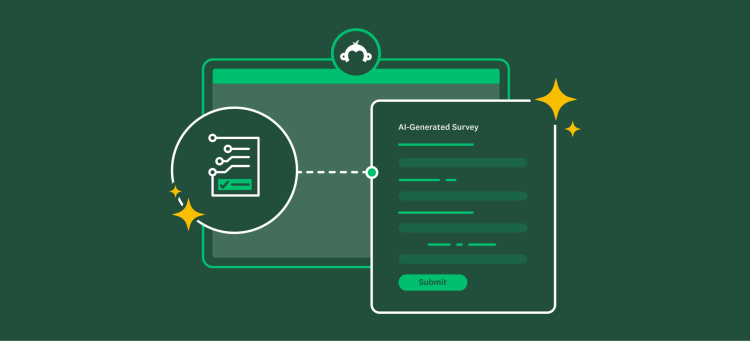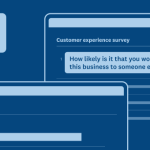Keeping your customers happy is the key to a successful business. But you know that. After all, we’d wager you started your business to satisfy your customers and solve their problems.
It’s also fair to say that most companies know they need to gather customer feedback, since without it, you can’t know how good a job you’re doing. And that could spell disaster for your business. In fact, a recent SurveyMonkey audience study found that 57% of people have permanently stopped using a product after one bad experience. That’s all it takes.
Yet it can be hard to know the most effective way to get this feedback. If you use the right customer feedback questions, the insight you gain can help you see where you need to improve, understand your competition and even generate new ideas. But what are good feedback questions? What questions should you ask customers for insight that is both holistic and detailed? How can you gather feedback you can act on?
Fortunately, here at SurveyMonkey HQ, we know a thing or two about that, since customer satisfaction surveys are one of the most popular options among our users. So, to help you get started, we’ve pulled together 15 customer feedback questions to give you high quality, actionable data.
Keep tabs on your customer experience
Boost customer satisfaction with SurveyMonkey CX, our turn-key NPS solution that helps you collect, analyze, and take action on your customer feedback.
1. What's the main benefit you receive from our product/service?
Asking your customers to state the main benefit you offer them is helpful for focusing your efforts and resources. Say you’re a high street gym. You might want to know which of your selling points is the most important to your customers. You could use a closed-ended question here, providing a choice of things like location, exercise classes, personal training, exercise equipment or the availability of other gym branches. If you’re worried you haven’t covered everything, just provide an “other” option, with an open-text response for more details.
2. What part of our service/product makes you happy?
Asking customers what you do or offer that makes them happy is subtly different from asking about the main benefit you bring. Let’s use the gym example again. Customers might see location as your main benefit. But what makes them happy could be something entirely different. Maybe it’s that the staff greet them with a smile and know them by name. You might discover that one feature you thought was insignificant is in fact highly valued by your customers, which could motivate you to promote or enhance that aspect further.
3. What are your main problems with our product/service?
Your customers might have a few different gripes and grumbles, and it’s important that you listen. Don’t miss out on the opportunity to ask questions for customer feedback on areas in which you’re not delivering, and that are important to your customers. It’s probably a good idea to provide a selection of options for them to choose from. Maybe price is your weak spot, or you don’t reply to queries quickly enough.
4. If you could pick one thing you think we could do better, what would it be?
This might seem similar to the previous question, and indeed they are both customer service feedback questions, but the focus is slightly different. It encourages your customers to frame things positively, focusing on where there is room for improvement. And by asking them to narrow things down and prioritise just one thing you could do to improve, you’ll understand what’s most important to them.
5. Would you renew at the end of contract based on what you feel right now? Why or why not?
Repeat custom is a sign you’re doing something right. So, a question about whether your customers are likely to renew or re-purchase is an obvious one. But some companies forget to delve a little deeper by asking why. With this included, this customer feedback question is great for understanding the factors influencing their decision. It can help you nip any problems in the bud.
6. Would you recommend us to your friends and family, and why or why not?
Along the same lines as the previous question, this one will help you understand your customer’s overall satisfaction with your product or service. Where they differ is the level of satisfaction. For instance, an unsatisfied customer might still end up deciding to renew their mobile phone contract simply because they decide it’s too much hassle to change providers. But recommending a product or service to people they care about is going one step further. It’s the crème de la crème of customer satisfaction, which makes it an excellent customer feedback question.
7. If you had to choose a competitor, who would it be and why?
You’ll no doubt have an idea in mind of who your key competitors are. But things can change quickly. Perhaps you now have new competitors you hadn’t even heard of, or your customers are attracted to some unconventional alternatives you wouldn’t have previously thought of as competitors. This is a good feedback question for helping you find out. And by asking about the rationale behind the choice, you’ll understand what makes that company appealing. As a result, you might even decide to adjust your own offer to better meet this demand or perhaps redefine your target customers.
8. Why did you initially choose us and why do you continue to stay with us?
This question is great for taking account of how your customers’ perceptions and priorities may have changed, as well as how your product or service may have changed. Returning to the high street gym example, maybe a customer first picked your gym because they loved the sound of the yoga or HIIT classes. But after joining, they’ve discovered these classes are always overbooked, or the schedule’s changed and they can no longer attend. Perhaps what now keeps them from going down the road to the competition is a personal trainer they’re fond of. If your findings show you that it’s your personal trainers who keep your members coming back, then maybe you’ll decide to focus your efforts there, or maybe run a promotional campaign for PT sessions.
9. How often do you consider switching to our competition and why?
This question allows you to delve deeper into the stats behind your repeat customers. You can find out how many of these seemingly satisfied customers regularly consider switching. And by determining the why, you can act on any gaps in service to convince them to stay, or make sure you continue to prioritise areas in which you’re doing well.
10. Can you provide an example of a time when you were wowed by a product or service you’ve used and why?
This question allows you to gather inspiration from others. The industry might be different to your own, but examples your customers provide can prove thought-provoking. This might give ideas of how you could implement something similar. It’s also worthwhile thinking about the emotions behind their replies and look at why your customers were wowed by that example. Is it because the company was especially innovative? Or maybe it was a proactive approach to customer service?
11. What is one way we could help you overcome your main challenges for the year ahead?
Understanding your customers’ key challenges and concerns is incredibly valuable. Feedback questions like this not only allow you to put yourself in their shoes, but it can also be a useful learning opportunity. You might discover there’s a gap in the market or realise that you can repurpose or repackage a product or service to help solve your customers’ problems.
12. How do you need to transform your business over the next 18 months, and how can we help?
Today, more than ever, businesses can’t remain static. They need to respond to the current environment and the latest challenges. Changes might be small in scale or all-encompassing. Either way, this means that what has worked for them in the past isn’t necessarily going to work for them in the future. It’s for this reason that you need to gather regular customer feedback and ask about your customers’ upcoming changes, and importantly, how your business can help.
13. What’s one thing you wish we could do?
You’d be amazed at some of the ideas that can result from this one! As the people using your product or service on a regular basis, your customers are ideally placed to know where it’s lacking and how it might be improved. Just a handful of interesting ideas could give your business the edge it needs.
14. What would you like to see us keep (and/or stop) doing?
Brand loyalty can be a fickle thing. Sometimes, what sways a loyal customer or converts a new one may not actually be related to your service or product. Instead, it might be that your company has taken a stance on an important issue. For instance, maybe you’re a fashion brand and you’re committed to producing fair trade, sustainable clothes and supporting environmental charities. For some customers, your position on that matter could well be the difference between shopping with you or the competition. It’s important to ask your customers these questions so you can understand all the factors at play.
15. How can I help provide more value to your organisation?
Let’s imagine you run a digital marketing firm. Your clients are happy with your work, but they have difficulty justifying the cost of your services to the budget holder. You might need to demonstrate the impact of your work, and this could be a simple matter of providing specific reports. This is an excellent example of a customer feedback question that gives your clients added value while also making your own case even more convincing.
We’ve looked at a range of different types of customer service feedback questions, from benefits and problems with your product or service, to competitor research, in addition to focusing on your customers’ challenges and how you can help them overcome these. We’ve looked at some examples of good feedback questions to get the cogs turning.
But if you’re still not quite sure which questions to ask your customers, SurveyMonkey’s customer satisfaction survey templates are great for giving you a head start. They include sample customer feedback questions which you can then tailor or add to as you need.
And don’t forget, when it comes to gathering regular customer feedback, it’s important that you also act on it. Need SurveyMonkey's help making the most of customer feedback? Explore SurveyMonkey Enterprise.



